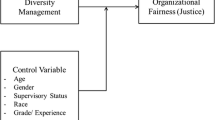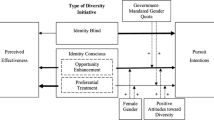Abstract
Does the presence (versus absence) of an organizational diversity award increase the perceived fairness of biased personnel procedures? Participants examined fair or unfair personnel procedures at a company that had received a diversity award or an award unrelated to diversity. When the company had received a diversity award (versus a control award), participants perceived the unfair personnel procedure as fairer for minorities, and White participants were more supportive of enacting the biased procedure. These findings suggest that organizations perceived as successfully supporting diversity might be afforded particular legitimacy to enact policies and procedures that disadvantage the very groups they are perceived as valuing.



Similar content being viewed by others
Notes
Excluding international students was an a priori decision, but including them in analyses does not change the pattern or significance of any of the reported results.
In a pilot study, participants perceived unstandardized interviews (M = 3.20, SD = 1.03) as less fair to minorities than standardized interviews (M = 3.63, SD = .89), t(40) = 2.01, p = .05, d = .31.
Although the present study focused on race, we included two exploratory items about fairness to women and fairness to men. Fairness to women showed similar results as fairness to racial minorities, and fairness to men showed similar results as fairness to Whites.
We were unable to exclude to Whites and examine mediated moderation for the two-way interaction between interview fairness and diversity condition because the interaction was not significant for procedural support, F(1, 835) = 1.80, p = .18.
As an initial examination of this possibility, we excluded non-Asian minorities from analyses to more directly compare White and Asian-Americans. For fairness to minorities, we replicated the interaction between diversity condition and interview fairness, F(1, 711) = 6.79, p = .009, where unfair procedures, F(1, 711) = 11.57, p = .001, but not fair procedures, F(1, 711) = .07, p = .79, were perceived as fairer to minorities in the presence of a diversity award. For procedural support, there was an interaction between diversity condition and race, F(1, 711) = 3.68, p = .055, where Whites, F(1, 711) = 4.56, p = .03, but not Asian-Americans, F(1, 711) = .53, p = .47, supported the procedures more when the company had a diversity award compared to a control award.
References
Bayer, P., Ross, S., & Topa, G. (2005). Place of work and place of residence: Informal hiring networks and labor market outcomes (No. w11019). National Bureau of Economic Research.
Brady, L. M., Kaiser, C. R., Major, B., & Kirby, T. A. (2015). It’s fair for us: Diversity structures cause women to legitimize discrimination. Journal of Experimental Social Psychology, 57, 100–110.
Brecher, E., Bragger, J., & Kutcher, E. (2006). The structured interview: Reducing biases toward applicants with physical disabilities. Employee Responsibilities and Rights Journal, 18, 155–170.
United States Census Bureau. (2012). Current Population Survey [Data file]. Available from www.census.gov/cps
Dana, J., Dawes, R., & Peterson, N. (2013). Belief in the unstructured interview: The persistence of an illusion. Judgment and Decision Making, 8(5), 512–520.
Dobbin, F. (2009). Inventing Equal Opportunity. Princeton, NJ: Princeton University Press.
Dover, T. L., Major, B., & Kaiser, C. R. (2013). Diversity initiatives, status, and system-justifying beliefs: When and how diversity efforts de-legitimize discrimination claims. Group Processes & Intergroup Relations. doi:10.1177/1368430213502560.
Edelman, L. B., Fuller, S. R., & Mara-Drita, I. (2001). Diversity rhetoric and the managerialization of law. American Journal of Sociology, 106(6), 1589–1641. doi:10.1086/321303.
Edelman, L. B., Krieger, L. H., Eliason, S. R., & Albiston, C. R. (2011). When organizations rule: Judicial deference to institutionalized employment structures. American Journal of Sociology, 117(3), 888–954.
Effron, D., & Monin, B. (2010). Letting people off the hook: When do good deeds excuse transgressions? Personality and Social Psychology Bulletin, 36(12), 1618–1634. doi:10.1177/0146167210385922.
Greenwald, A. G., & Banaji, M. R. (1995). Implicit social cognition: Attitudes, self-esteem, and stereotypes. Psychological review, 102(1), 4.
Guimond, S., Crisp, R. J., De Oliveira, P., Kamiejski, R., Kteily, N., Kuepper, B., et al. (2013). Diversity policy, social dominance, and intergroup relations: Predicting prejudice in changing social and political contexts. Journal of Personality and Social Psychology, 104(6), 941.
Hayes, A. F. (2013). Introduction to mediation, moderation, and conditional process analysis: A regression based approach. Guilford Press.
Highhouse, S. (2008). Stubborn reliance on intuition and subjectivity in employee selection. Industrial and Organizational Psychology, 1(3), 333–342.
Huffcutt, A. I., & Roth, P. L. (1998). Racial group differences in employment interview evaluations. Journal of Applied Psychology, 83(2), 179–189. doi:10.1037//0021-9010.83.2.179.
Kaiser, C. R., Major, B., Jurcevic, I., Dover, T. L., Brady, L. M., & Shapiro, J. R. (2013). Presumed fair: Ironic effects of organizational diversity structures. Journal of Personality and Social Psychology, 104(3), 504–519. doi:10.1037/a0030838.
Kalev, A., Kelly, E., & Dobbin, F. (2006). Best practices or best guesses? Assessing the efficacy of corporate affirmative action and diversity policies. American Sociological Review, 71(4), 589–617.
Levashina, J., Hartwell, C. J., Morgeson, F. P., & Campion, M. A. (2014). The structured employment interview: Narrative and quantitative review of the research literature. Personnel Psychology, 67(1), 241–293. doi:10.1111/peps.12052.
Lowery, B. S., Unzueta, M. M., Knowles, E. D., & Goff, P. A. (2006). Concern for the in-group and opposition to affirmative action. Journal of Personality and Social Psychology, 90(6), 961–974. doi:10.1037/0022-3514.90.6.961.
Marques, J. F. (2010). Colorful window dressing: A critical review on workplace diversity in three major American corporations. Human Resource Development Quarterly, 21, 435–446. doi:10.1002/hrdq.20045.
Martell, R. F., Lane, D. M., & Emrich, C. (1996). Male–female differences: A computer simulation. American Psychologist, 51(2), 157–158.
Merritt, A. C., Effron, D. A., & Monin, B. (2010). Moral self-licensing: When being good frees us to be bad. Social and Personality, 5, 344–357.
Plaut, V. C., Garnett, F. G., Buffardi, L. E., & Sanchez-Burks, J. (2011). “What about me?” Perceptions of exclusion and whites’ reactions to multiculturalism. Journal of Personality and Social Psychology, 101(2), 337–353. doi:10.1037/a0022832.
Rheinschmidt, M. L., Plaut, V. C., & Rios, K. (2014, February). Institutional diversity cues and threat perceptions among ethnic groups. Symposium conducted at the Annual Meeting of the Society for Personality and Social Psychology, Austin, TX.
Roberson, L., Kulik, C. T., & Tan, R. Y. (2013). Effective diversity training. In Q. M. Roberson (Ed.), The Oxford handbook of diversity and work. New York, NY: Oxford University Press.
Schwartz, N. D. (2013, January 27). In Hiring, a Friend in Need Is a Prospect, Indeed. New York Times. Retrieved from http://www.nytimes.com/2013/01/28/business/employers-increasingly-rely-on-internal-referrals-in-hiring.html?pagewanted=1
Triana, M., & Garcia, M. (2009). Valuing diversity: A group-value approach to understanding the importance of organizational efforts to support diversity. Journal of Organizational Behavior, 30, 941–962. doi:10.1002/job.
Tyler, T. R. (2000). Multiculturalism and the willingness of citizens to defer to law and to legal authorities. Law & Social Inquiry, 25(4), 983–1019.
Tyler, T. R. (2001). A psychological perspective on the legitimacy of institutions and authorities. In J. Jost & B. Major (Eds.), The Psychology of Legitimacy (pp. 176–204). New York: Cambridge University Press.
Tyler, T. R. (2006). Psychological perspectives on legitimacy and legitimation. Annual Review of Psychology, 57, 375–400. doi:10.1146/annurev.psych.57.102904.190038.
Tyler, T. R., & Blader, S. L. (2003). The group engagement model: Procedural justice, social identity, and cooperative behavior. Personality and Social Psychology Review, 7(4), 349–361.
Unzueta, M. M., & Binning, K. R. (2010). Which racial groups are associated with diversity? Cultural Diversity & Ethnic Minority Psychology, 16(3), 443–446. doi:10.1037/a0019723.
Acknowledgments
This research was supported by a National Science Foundation Graduate Research Fellowship awarded to Teri Kirby and National Science Foundation Grants 1053732 & 1052886 awarded collaboratively to Brenda Major and Cheryl Kaiser.
Conflict of interest
The authors declare that they have no conflict of interest.
Ethical standard
All procedures performed in studies involving human participants were in accordance with the ethical standards of the institutional and/or national research committee and with the 1964 Helsinki declaration and its later amendments or comparable ethical standards.
Author information
Authors and Affiliations
Corresponding authors
Additional information
We thank our research team, especially Florence Lau, for their assistance with data collection.
Appendix: Standardized and Unstandardized Interviewing Procedure Descriptions
Appendix: Standardized and Unstandardized Interviewing Procedure Descriptions
[Standardized (fair) interviewing procedure:]
Patterson Group is debating whether to conduct standardized interviews when interviewing job candidates, which involves asking candidates a standard set of pre-selected questions in the same order for each candidate.
Supporters of standardized interviews argue:
-
They allow the interviewers to get an accurate representation of each candidate independent of what interview questions are asked.
-
They result in treating all candidates similarly because all interviewers ask questions the same way.
[Unstandardized (unfair) interviewing procedure:]
Patterson Group is debating whether to conduct unstandardized interviews when interviewing job candidates, which gives the interviewer freedom as to what questions are asked. Questions can be included or excluded depending on the potential employee’s individual situation or responses to questions.
Supporters of unstandardized interviews argue:
-
They allow the interviewers to get an accurate representation of each candidate as questions can be created to address candidates’ unique attributes.
-
They result in treating all candidates as unique individuals because all interviewers ask questions that reflect the individual’s work history.
Rights and permissions
About this article
Cite this article
Kirby, T.A., Kaiser, C.R. & Major, B. Insidious Procedures: Diversity Awards Legitimize Unfair Organizational Practices. Soc Just Res 28, 169–186 (2015). https://doi.org/10.1007/s11211-015-0240-z
Published:
Issue Date:
DOI: https://doi.org/10.1007/s11211-015-0240-z




